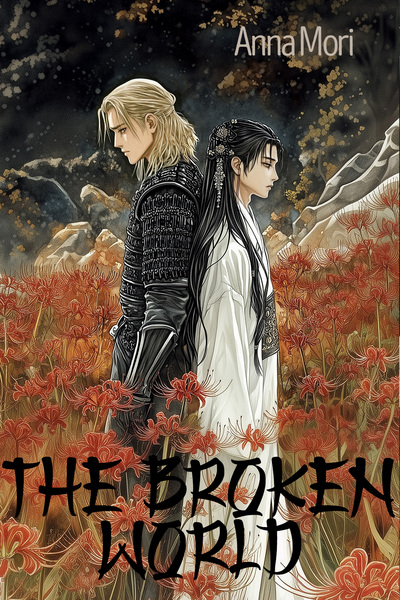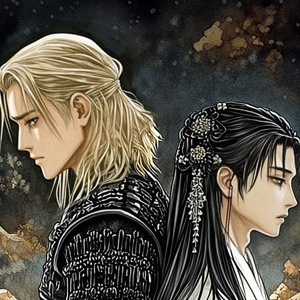My soldiers doubt that this nation of poets could pose a threat in the coming war, but their warriors are unlike the courtiers — the culture of the warrior class is far harsher. Yet even there, as among the courtiers, suffering, fragility, and the fleeting nature of life, as well as a beautiful death, are romanticized. These people would sooner slit their own throats than act against their sense of dignity and honor. They follow orders without question, even in minor matters, and their dog-like loyalty to their commanders could make them formidable opponents...
Above, I called Ryukoku a nation of poets, but in some respects, they are absolute barbarians — though they call us by this word. I already mentioned the religiosity of the Dragonfolk; in practice, this means that only hereditary aristocrats — the offspring of the Celestial Dragon — have any say in the affairs of the country, while a commoner has no chance to rise, whether through courage and martial skill, as in our country, or through intellect, as in Yuigui.
Moreover, Ryukoku is the last place I would recommend for a woman to visit. The life of an aristocratic woman unfolds in a gilded cage, which she leaves only to move from her father's family to her husband's. If you told any of the men here that a woman could ride a horse, shoot a bow or crossbow, or lead a unit into battle as well as a man, they would laugh, thinking it a joke. In the eyes of a nobleman of Ryukoku, a woman is a weak, foolish creature — a flower meant only to delight men with its beauty, and which, of course, withers quickly under such treatment. However, the lives of ordinary townspeople, both men and women, are more akin to what we're accustomed to, as their daily lives are more closely tied to the natural order...
He lifted his brush from the paper and listened. Voices and footsteps — someone was approaching the tea house. Who among the courtiers was awake at this early hour? Leaving his writing behind, he stood and stepped outside.
Three figures were drawing near. At first, Gerel recognized the voice of the emperor. When they came closer, he identified the other two as the Head of the Tax Bureau and the Right Minister. The Right Minister, as far as Gerel had understood the governance of Ryukoku, was also primarily responsible for finances, so it was no surprise that their conversation revolved around that subject.
"Why do you think the Merchant Guild will agree to help?" the minister asked.
"We have nothing to pay them for their assistance, Your Majesty," replied the head of the Tax Bureau in a mournful tone.
"I had an idea," the emperor said. "We may not need money. I spoke to Kaneiro, and he mentioned that his library holds some rare scholarly treatises. Perhaps those might interest the Merchant Guild..." His voice, though steady, betrayed weariness. From behind the veil that obscured Yukinari's face, Gerel couldn't see his expression, but the fatigue was unmistakable.
"Yes, that could work. We could invite a representative from the Guild to examine the texts. If we manage to convince them to fund the project, we'll have a chance..."
They weren't heading toward the tea house and would have walked past, but the emperor noticed Gerel sitting on the veranda. While the minister and the Tax Bureau head visibly stiffened, clearly preferring not to acknowledge his presence, Yukinari turned toward him with an assured smile.
"Your Majesty," Gerel greeted, bowing.
"General," Yukinari replied with a slight nod.
After their meeting in the city and the conversation that followed, there had been a subtle chill between them. Yet Gerel found himself glad to see the emperor. Yukinari's charm was disarming, almost impossible to resist.
Despite the sleepless nights evident in his voice, the emperor had dressed meticulously, as always. Today, he wore something in shades of violet and crimson — ten shades of violet, to be precise. He'd heard this particular color combination referred to as "the reverse side of a maple leaf." Not that Gerel seriously aimed to master the intricacies of Ryukoku court etiquette, but his sharp memory, honed by years of necessity, absorbed such details.
And knowledge of Ryukoku's courtly ways would undoubtedly prove useful soon, regardless of how the negotiations concluded.
"May I ask what brings you here so early?" Gerel inquired.
"It's simple — I prefer to discuss matters in the garden rather than within four walls," the emperor said lightly, deftly evading the heart of the question. (Indeed, it was unlikely he would openly admit that sleepless nights poring over documents filled with the word "loss" had driven him outdoors. Gerel thought of this with a touch of wry humor.) "Might I ask the same of you?"
"I'm writing a letter. I'm used to rising early from my time on campaigns. And perhaps you'll find this amusing, but I have a habit of recording what I see and occasionally sending letters to my emperor. Tokhung, of course, is keen to hear about the progress of our negotiations. Besides, much of what I observe in Shinju strikes me as fascinating and worth noting."
"Ah, then we've interrupted you. My apologies," said the emperor, though his tone held more curiosity than regret. His gaze lingered on the scattered papers, though he politely kept his distance, refraining from reading them.
The head of the Tax Bureau decided to interject:
"Remarkable! It's unusual to hear of you writing letters."
"Surprised that a barbarian from the West can write?" Gerel asked, smirking.
"It's simply unexpected for a soldier to have such inclinations. Recently, a merchant named Choi visited Nishiyama... It was said he couldn't even read the terms of his own contract and had to ask one of his companions for help."
"Though it's no secret that some of us harbor complicated feelings toward your people," the Minister of the Right added smoothly, "so one might question the reliability of such rumors. Malicious tongues often claim that strength and courage suffice where intellect is lacking. But of course, that's an unfair assessment."
His mild smile belied the sting of his words.
Such remarks might have offended Gerel if he had felt any loyalty to Cheongju — but he didn't. If the rumors concerned Choi Minsu, a member of one of Cheongju's noble families, Gerel was certain they were true. That man was as dull as an ox and barely literate.
"I must admit, my countrymen rarely trouble themselves with the pursuit of knowledge," Gerel replied dryly. "But that's their choice to make."
"You must be an exceptionally gifted individual, for learning to come so easily to you," said the minister, his words courteous but laced with venom.
Gerel found himself perversely enjoying the palace's conversational style. Words here always seemed to mean something other than their surface. How much duller things were in Cheongju, where insults — and hatred — were blunt and direct. Here, every exchange felt like a dance, a delicate assessment of one's opponent.
Garel knew how to control himself when he heard offensive attacks; he could also joke in such a way that his interlocutor turned pale and fell silent. Most often, all that was required was a fixed gaze; his appearance did the rest for him. So, he paused for a moment, examining the minister with his unnatural, ice-blue eyes as sharp as knives, before curling his lips into a nearly friendly grin.
"Perhaps."
That single word was enough to make the minister recoil slightly, silenced.
"Knowledge comes easily to no one," Yukinari said, his calm, commanding tone restoring order.
"You strike me as someone who absorbs things quickly," Gerel retorted, still slightly sharp.
Indeed, was there anything the young emperor of Ryukoku wasn't good at? Handsome, intelligent, a skilled ruler... even a master of Mist and Clouds...
"Hardly," Yukinari said with a soft chuckle. "It would be wonderful if things came effortlessly — I'd get more sleep. But that's far from the truth."
He hesitated, as if debating whether to share more, then confessed:
"At the Festival of the Seven Autumn Grasses, you complimented my poetry. But I didn't deserve that praise. I'm no poet. I lack the talent to craft verses on the spur of the moment. I prepare them in advance, keeping poems ready on various themes. They aren't even entirely mine. Take Ashikage — you saw him at the festival, he works in the archives — he's truly talented. Me? I simply read extensively and piece together fragments from others' works. Perhaps the courtiers have noticed and continue to praise my poems out of pity."
"Do you plan your outfits and hairstyles in advance as well?" Gerel teased.
The veil over Yukinari's face trembled slightly, as if he'd been about to reply but thought better of it.
Gerel pictured the emperor sketching costume designs with a furrowed brow and found himself less amused than he'd expected. He saw Yukinari from a new perspective, only now realizing that his perfection was the result of relentless effort. Gerel realized that he had been wrong to condemn the Ryukoku people for their elaborate outfits, their impeccable grooming, and their careful choice of behavior and words. There was a certain artificiality in it, yes; but it also meant enormous hard work...
"I think diligence is undervalued. It deserves more respect than talent — and certainly no shame."
Seeing that Gerel spoke sincerely, Yukinari responded with a grateful nod.
"I agree. When — and why — did you decide to learn to read?"
The question caught Gerel off guard. When unsure how to respond, he tended to close himself off, speaking coldly or bluntly.
"Knowledge didn't come easily to me either — especially literacy. I began learning characters late, around the age of eight, so I devoted hours to it every day," he admitted reluctantly. "That's why I still make time for it now. Forgive me, but there's nothing more to tell."
He hadn't meant to be rude, but he wasn't one for small talk, especially about his childhood — certainly not in the presence of the minister and the Tax Bureau head.
...Knowledge had come to him at a steep cost. Without it, he wouldn't have survived.
He recalled himself at seven: a scrawny, half-starved servant boy with yellow hair and an odd face, struggling to learn the language of Cheongju. Every day brought fresh bruises from bullies. He'd swallow his tears, fight back — clumsily at first — and learn.
His master had allowed him to attend lessons with his children, thanks to his mother's pleading. Though forbidden to speak or draw attention, Gerel had been grateful for the opportunity. If at first he had fought with his offenders desperately, but without rules, scratching and biting like a street cat, then he came up with the idea of watching the training of the master's children — he watched with all his eyes the movements that the wrestling tutor showed, and then tried to use these techniques in fights.
And when he wasn't absorbing every move of the master's wrestling tutor, he spent hours in the library, deciphering the strange symbols of the Land of the Tortoise. By the time the bullying stopped, he spoke Cheongjuan better than most locals and could wield both his fists and his wit with deadly precision. Over time, he even won the respect of other city children: it turned out that it was enough to come up with a good plan for theft a couple of times and outwit the city guards...
If he had a choice, he'd have gladly spent sleepless nights crafting poetry, studying finances, and planning outfits — anything but reliving those battles. However, he certainly wasn't going to argue with Yukinari about whose life was harder.
(He remembered the emperor's metaphor of the crates. What if life doesn't have to be an endless series of heavy burdens?).
The emperor looked at him and seemed to be trying to guess what he was thinking. He seemed to understand that Gerel's overly dry answer was not dictated by anger or resentment.
"I enjoyed playing Mist and Clouds with you," he said at last. "You're a worthy opponent. If you'd like to play again, join me tonight at the same time and place as before."
Surprised, Gerel raised an eyebrow. Hadn't they already debated the only problem worth solving during their last match, to no conclusion?
Still, he agreed. Perhaps Yukinari truly just wanted to play Mist and Clouds, without any political tricks in mind.
The emperor gave an elegant nod and departed.











Comments (0)
See all